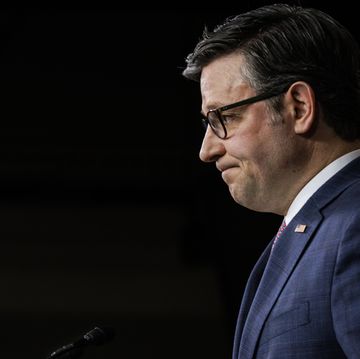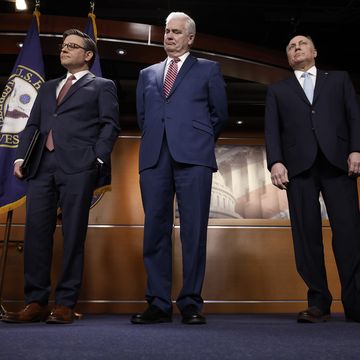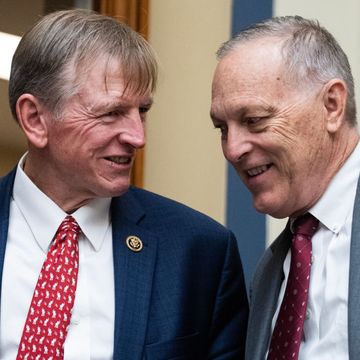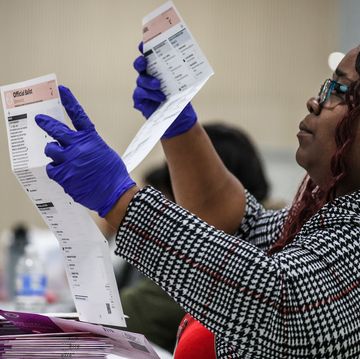(Permanent musical accompaniment to this post)
Being our semi-regular weekly survey of what's goin' down in the several states, where, as we know, the real work of governmentin' gets done, and where the riverboat captain, he knows your fate.
Regulars at the shebeen know that it is the opinion of management that an elected judiciary is the second-worst idea in American politics. Nonetheless, because management is not the emperor of the known universe, some states insist on electing their supreme courts—and as recent events in Arizona have demonstrated, elected or appointed, state supreme courts are the very tip of the tip of the spear. So the good folks at Bolts magazine have put together a compendium of information concerning state supreme court elections around the country.
The survey points us to the swing states of Michigan and Ohio, both with elected supremes, as two of the states to watch in 2024, just as they are in the presidential election. Michigan's Democrats hold a one-vote majority while the same holds true for Ohio's Republicans, although the latter is unique in that the governor's son is a sitting justice. And there are other crucial elections as well.
The 2024 cycle is already well underway. Three incumbents in Texas were voted out in March in the GOP primary after facing attacks by far-right politicians. An Illinois justice survived a primary. And an Arkansas justice hopped to another seat on the bench to evade retirement rules. The stakes only escalate from here. Conservatives hope to gain ground on Montana’s liberal-leaning court thanks to the retirement of two justices long targeted by the right. In Kentucky, the retirement of a conservative-leaning justice may have the opposite effect. Democrats risk falling even further behind on North Carolina’s court, while the prospect of Michigan and Ohio’s courts flipping carries important ramifications for sentencing and democracy. Across Arizona and Florida, four justices who voted to uphold abortion bans this month are up for retention—two in each state. Three justices who took part in the Colorado supreme court’s decision to bar Donald Trump from the ballot also face retention tests. A justice who voted against the erosion of direct democracy faces reelection in Mississippi.
As is the case in so many things, that business in Mississippi is particularly egregious. The fight is over the right of the citizens to present initiative petitions. The Mississippi constitution mandates that an initiative campaign must gather signatures from all five of Mississippi's congressional districts. However, in 2000, Mississippi dropped in population, so it lost a district, leaving it with four. In 2021, the state supreme court ruled that, because Mississippi no longer has five congressional districts, no initiative can be constitutional. And as recently as a week ago, the Mississippi state legislature refused to act on a bill that would remedy this absurdly literal ruling. Two years ago, Justice Robert Chamberlin wrote in dissent that the ruling "stretched the limits of reason." He's running for reelection this time around. And, as a bonus, one of the initiatives stalled would require Mississippi to accept the FREE MONEY! available from Medicaid through the Affordable Care Act. So, yes, voting for your supreme court judges has profound consequences in real life.
We skip on up to Nebraska, where there are some shenanigans being undertaken in the Unicameral, the state's one-house legislature. Another quirk of Nebraska politics is that, in presidential election years, its five electoral votes are split into two districts. In 2020, the president won one of those districts. This has stuck in the former president*'s craw, so he and his allies in the Unicameral are fighting to enact a winner-take-all system in time for the November ballot. From CNN:
Even after the Nebraska Legislature closed the door on a pressure campaign intended to keep President Joe Biden from winning one of the state’s five electoral votes – as he did in 2020 by carrying the Omaha-anchored 2nd Congressional District – Trump loyalists are pledging to keep the effort alive. “We are going to keep on pushing and keep on pushing and keep on pushing until Nebraska gets winner-take-all,” said conservative activist Charlie Kirk, who appeared alongside several state Republican officials here Tuesday to rally support for the change. “Nebraska could pick a president.”
Charlie Kirk? Gee, they really called out the A-Team for this one.
Less than seven months before the November election, the Republican-led effort to change election law in Nebraska, which Democrats have vowed to block, underscores the remarkably close nature of a Biden-Trump rematch and the precarious path to winning a majority in the Electoral College, or 270 electoral votes. “You have outsiders trying to change the rules – you can’t do that,” said Precious McKesson, the executive director of the Nebraska Democratic Party who cast the state’s lone Electoral College vote for Biden and Vice President Kamala Harris in 2020. “Republicans know that vote is very critical.”
Personally, I think this is a charming little artifact from a bygone era. I know that nobody cared about Nebraska's little quirk until it inconvenienced El Caudillo del Mar-a-Lago in 2020. And when Republican congressman Don Bacon says that he's concerned that the split electoral vote will lessen Nebraska's influence on the national scene, he's plainly selling wooden nickels. Right now, the split electoral vote has made Nebraska central to the plans of both major-party presidential campaigns. Change that and Nebraska is just another flyover state with five noncompetitive electoral votes. Meanwhile, all that attention will swing to Maine, which does the same thing, except without all the foofaraw. That's because the former president* glommed one of Maine's electoral votes in 2020, so Maine will be spared the presence of Charlie Kirk.
And we conclude, as is our custom, in the great state of Oklahoma, whence Blog Official Portuguese Man o' War Friedman of the Plains brings us a tale of inspiration from the local judiciary. From The Frontier:
An Oklahoma Court of Criminal Appeals judge said Department of Corrections staff tasked with carrying out the state’s backlog of executions need to “suck it up.” Judge Gary Lumpkin made the remarks during a hearing Tuesday on the state’s request to further delay the time between executions from 60 days to 90 days to reduce strain on staff. The Oklahoma Attorney General’s Office and Department of Corrections say the change would combat trauma, staffing shortages, and ensure the state doesn’t have another botched execution. The agencies filed a motion in January that said the current pace of executions isn’t sustainable. But Lumpkin said he isn’t buying into the “sympathy stuff.”
Judge Roy Bean, presiding... from beyond the grave!
Lumpkin told agency leaders they need to “man up.”
“We set a reasonable amount of time to start this out, and y’all keep pushing it and pushing it and pushing it,” Lumpkin told Oklahoma Attorney General Gentner Drummond at the hearing. “Who’s to say next month you won’t come in and say I need 120 days? This stuff needs to stop, and people need to suck it up, realize they have a hard job to do, and get it done in a timely, proficient, professional way.”
Long ago, for a magazine story that never ran, I went to Mississippi to write about the death penalty because the governor of the state, a Lumpkin of a man named Kirk Fordice, had announced his intention to turn Mississippi into "the capital of capital punishment." I thought this a rather strange selling point for the Magnolia State, so I went down there and kicked some rocks around to see what the people closest to the operation of the death penalty thought about the whole business. Talking to a former warden who had presided over several executions until he simply couldn't do it anymore, couldn't handle the mechanism of killing people, couldn't stand one more press conference in the middle of the night explaining to the second how death had come. He took long pauses between words until he just couldn't come up with any more. I remember a clock ticking somewhere in the house.
This is your democracy, America. Cherish it.

Charles P Pierce is the author of four books, most recently Idiot America, and has been a working journalist since 1976. He lives near Boston and has three children.













